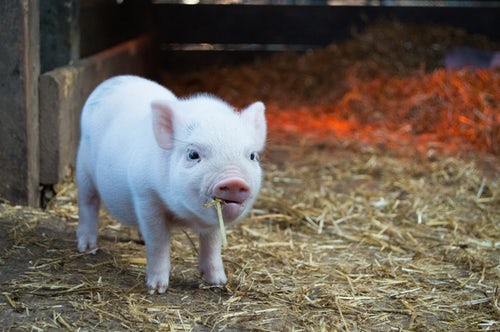Surprising discoveries about the life of pigs
Intriguing – and unpredicted – gender differences in the social-play behaviour of young pigs, with links to aggression later in life, have been uncovered by new research from IGFS.

The study, published in the respected journal Scientific Reports, part of the Nature group of publications, investigated how play behaviour differed between 12 litters of piglets who could interact freely with non-littermates in an adjacent pen – termed ‘socialisation’ – and that of 12 ‘control’ litters, maintained in their own pen.
Early life is a critical period for behavioural development in animals but, contrary to all predictions, levels of play fighting were not found to differ between the socialised and control groups. Males, however, were found to perform higher levels of play fighting than females. Research lead, Dr Gareth Arnott, and doctoral student Jennifer Weller, based at IGFS, suggested this reflected the development needed for pigs’ later-life social environment. This differs between the sexes, with adult wild boars engaging in escalated fights to gain access to groups of females.
In addition, the researchers examined links to later-life aggression, an important welfare concern in pig farming. Perhaps surprisingly, pigs socialised in early life were found to more quickly attack an ‘intruder’ pig introduced to the home pen.
Commenting on this, the researchers suggested an increased ability of socialised individuals to more rapidly assess a dominance hierarchy compared to their non-socialised counterparts, possibly mediated by the experience of interacting with a greater range of play partners.
Furthermore, there was a curious gender effect, whereby it was females with the higher levels of early life play fighting who attacked more quickly in the intruder test; in males, there was no correlation evidenced between early play-fighting and later aggression.
In the wild, female pigs live in groups while males are more solitary, which may incline females to being more attuned to group structures and pecking orders.
Dr Arnott added: “Ultimately, we need more research in this area as there are still a lot of knowledge gaps, hypotheses and assumptions around early play in animals. There isn’t a great deal of robust evidence, which is why this study is important.
“We’ve uncovered something interesting and confounding – not only around the influence of early play, but also the role of sex which has been, to date, relatively overlooked.
“Although studies on play are of fundamental interest from an evolutionary perspective, they also have important animal-welfare implications in terms of effects on later-life behaviour and managing aggression within captive settings.”
Following on from these findings, the research team is now examining links between play experience and later-life dominance, and assessment ability during aggressive encounters.
